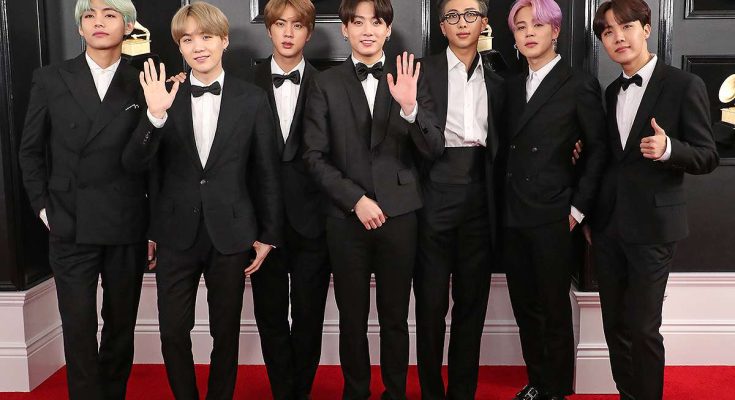BTS, the seven-member South Korean boy band, is more than just a music group; they are a cultural phenomenon that has redefined what it means to be global pop icons in the 21st century. From their humble beginnings to commanding sold-out stadiums around the world, BTS’s journey is a testament to hard work, authenticity, and an unbreakable connection with their fans. This story is about how seven dreamers — RM, Jin, Suga, J-Hope, Jimin, V, and Jungkook — transformed from unknown trainees into global legends, a feat now immortalized and celebrated in their documentary, BTS KPOP KINGS: How Seven Dreamers Became Global Legends — a must-watch for anyone fascinated by the power of music and culture.
The story begins in the bustling city of Seoul, South Korea, where BTS was formed under Big Hit Entertainment, a relatively small entertainment company in 2013. Unlike the industry giants that dominated K-pop, Big Hit was a startup company with limited resources but big ambitions. RM, the group’s leader, was originally a solo underground rapper known as Rap Monster. He was the first to be recruited, bringing with him a raw talent and a vision for a group that would push beyond the boundaries of conventional K-pop.
Each member brought something unique to the table, contributing to the band’s dynamic chemistry and versatility. Jin, the oldest, was known for his vocal ability and worldwide handsome visuals; Suga, the introspective rapper and producer, brought depth and emotional honesty; J-Hope’s infectious energy and dance skills made every performance electric; Jimin’s charisma and vocal tone captured hearts; V’s deep voice and quirky personality added charm; and Jungkook, the youngest, was the all-around performer with an innate talent for singing, dancing, and connecting with fans.
BTS’s early days were far from glamorous. They trained intensely, sometimes for over ten hours a day, perfecting their vocals, dance routines, and stage presence. Their debut was modest, and their first album, 2 Cool 4 Skool, was a gritty, raw introduction that reflected the struggles of youth, social pressures, and mental health — themes that were rarely touched upon in mainstream K-pop at the time. Their authenticity resonated with a growing audience of young people who felt misunderstood by traditional media and society.
What set BTS apart early on was their willingness to speak openly about mental health, self-love, and societal issues. Instead of just delivering catchy pop tunes and flawless choreography, they crafted music that had meaning and purpose. Their lyrics, often co-written by the members themselves, explored topics such as self-identity, anxiety, depression, and the quest for personal freedom. This lyrical honesty was a breath of fresh air and helped build a loyal fanbase known as ARMY (Adorable Representative MC for Youth), who found solace and strength in BTS’s music.
BTS’s rise was gradual but unstoppable. They started gaining attention in South Korea and quickly extended their reach to international audiences. A turning point came with the release of their album The Most Beautiful Moment in Life, Part 1 in 2015, which showcased a more polished sound and lyrical maturity. Singles like “I Need U” and “Run” combined catchy melodies with introspective themes, winning over fans worldwide. BTS wasn’t just a boy band—they were storytellers, shining a light on the trials and triumphs of youth in a way that transcended cultural and language barriers.
Their social media presence was another game changer. BTS used platforms like Twitter, YouTube, and V Live to connect directly with fans, sharing behind-the-scenes moments, live broadcasts, and candid conversations. This transparent communication cultivated a sense of intimacy and community. ARMY wasn’t just a fanbase; they were a movement. They translated BTS’s lyrics, organized streaming parties, and promoted the group tirelessly, creating a global network of support that helped BTS break into markets traditionally difficult for Korean artists, like the United States and Europe.
BTS’s breakthrough in the Western market came with their 2017 album Love Yourself: Her. The lead single “DNA” was a vibrant pop anthem that combined EDM and hip-hop influences, appealing to a broader audience. They performed on major American TV shows like The Ellen DeGeneres Show and The Tonight Show Starring Jimmy Fallon, marking the first time a Korean group had reached such mainstream visibility in the U.S. Their energetic and flawless performances drew praise from critics and fans alike, proving that BTS could compete on the world stage.
Following this, the Love Yourself series — which included Her, Tear, and Answer — became a cultural landmark. The series’ central message of self-love and acceptance resonated globally, inspiring millions to embrace their true selves. BTS took their message beyond music, collaborating with UNICEF on the “Love Myself” campaign to end violence against children and teens. Their influence extended into philanthropy, fashion, and even diplomacy, as they spoke at the United Nations and met with world leaders to promote youth empowerment.
In 2018, BTS made history by becoming the first Korean group to top the Billboard 200 chart with their album Love Yourself: Tear. The achievement marked a seismic shift in the global music industry, signaling that language and cultural differences were no longer barriers to success. The group continued to break records with their subsequent albums, including Map of the Soul: Persona and BE, blending genres like hip-hop, R&B, rock, and pop, while continuing to evolve their sound and artistic vision.
Their artistry wasn’t limited to music alone; BTS members took active roles in songwriting and producing, which added layers of authenticity and creativity to their work. This hands-on approach, coupled with their genuine personalities, made fans feel like they were witnessing the growth of seven individuals pouring their hearts into their craft. BTS concerts became immersive experiences filled with intricate choreography, heartfelt speeches, and powerful visual storytelling, turning every show into a celebration of resilience and hope.
The documentary BTS KPOP KINGS: How Seven Dreamers Became Global Legends captures this incredible journey with intimate access and heartfelt interviews. It reveals the struggles behind the scenes—the physical exhaustion, emotional battles, and the constant pressure of living up to global expectations. The film also celebrates the unbreakable bond among the members and the unique relationship they share with ARMY, which is at the core of their success. It showcases how BTS’s dedication to authenticity and connection has not only transformed their lives but also redefined the possibilities for artists worldwide.
The story of BTS is also a story about cultural impact. They have shattered stereotypes about K-pop and Asian artists, challenging preconceived notions and opening doors for other acts. BTS’s success has sparked a global wave of interest in Korean culture, language, and music, contributing to what many call the “Korean Wave” or Hallyu. Their influence extends beyond entertainment, inspiring conversations about diversity, inclusion, and representation on a global scale.
What truly sets BTS apart is their unwavering commitment to their values. Despite their fame, they remain humble and grounded, often emphasizing their gratitude towards their fans and their desire to use their platform for good. They have been vocal advocates for mental health awareness, self-care, and breaking down social stigmas—topics that are often taboo in many cultures. This openness has helped reduce stigma and foster global dialogue, making BTS not just entertainers but role models for millions.
The group’s resilience has been remarkable, especially considering the pressures they face in an industry known for its intense competition and scrutiny. BTS has faced controversies, challenges, and moments of doubt, yet they have persevered through their passion and belief in their mission. Their story is a powerful reminder that dreams are attainable through dedication, teamwork, and staying true to oneself.
As BTS continues to evolve, their impact only grows stronger. They have expanded into solo projects, philanthropic efforts, and collaborations with global artists, demonstrating versatility and an unrelenting desire to innovate. Fans eagerly anticipate their next moves, knowing that BTS will continue to break boundaries and inspire generations to come.
In essence, BTS’s rise from seven unknown dreamers to global kings of K-pop is a story about the transformative power of music, culture, and community. Their journey is not just about fame and records but about inspiring others to believe in their own dreams and to embrace their true selves. The documentary BTS KPOP KINGS: How Seven Dreamers Became Global Legends is a tribute to this extraordinary journey, capturing the spirit, struggles, and triumphs of a group that changed the world, one song at a time.
Now streaming, this documentary invites viewers to experience the magic of BTS firsthand—offering an intimate glimpse into the lives of seven young men who dared to dream big and, in doing so, created a legacy that will echo for decades. Whether you are a longtime ARMY member or new to the phenomenon, the story of BTS is a universal tale of hope, perseverance, and the enduring power of connection through music.



